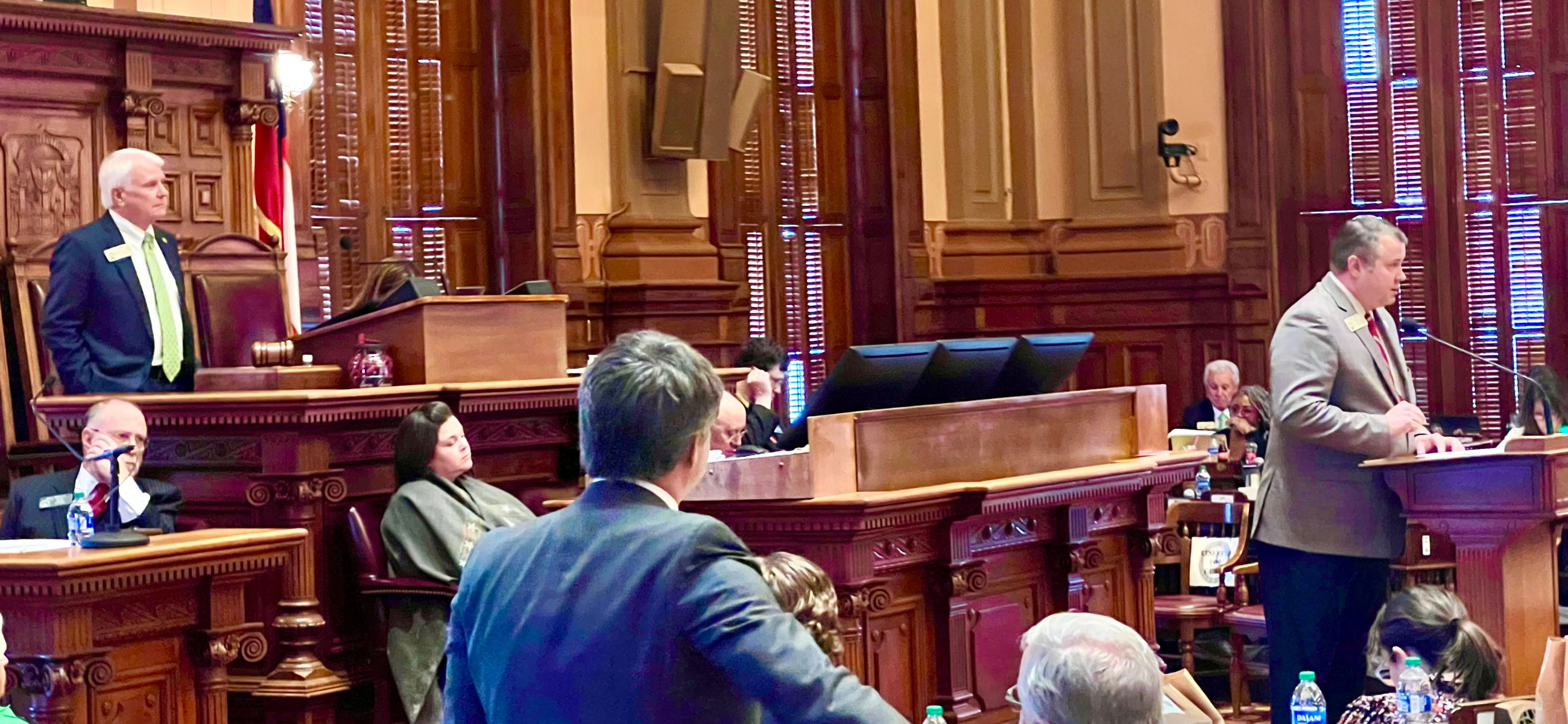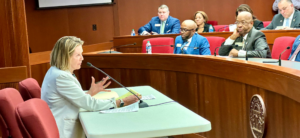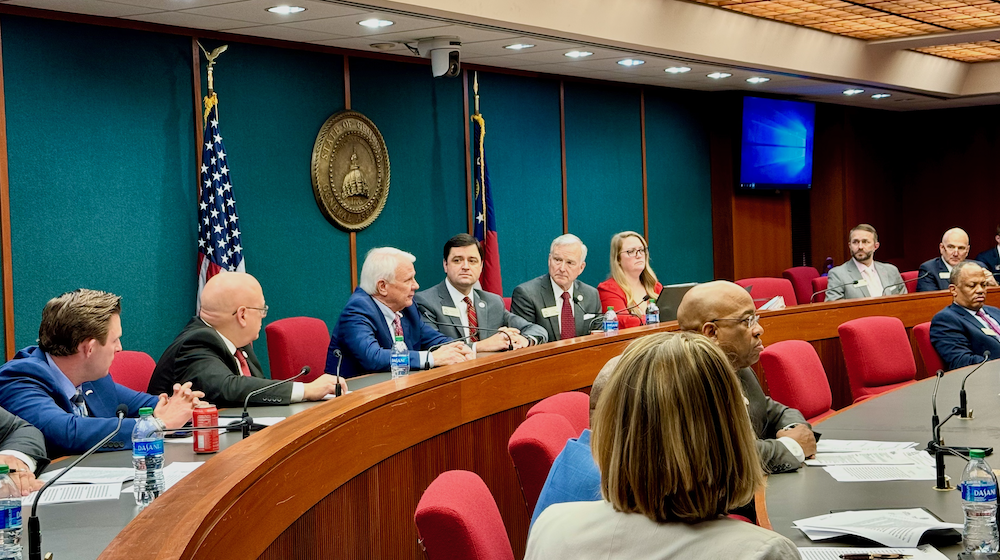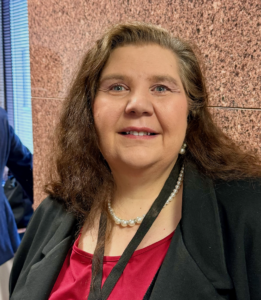Stay ahead of the curve as a political insider with deep policy analysis, daily briefings and policy-shaping tools.
Request a DemoPrivate school voucher bill narrowly passes House amid outcry from Democrats

Rep. Will Wade speaks in favor of SB 233 on the House floor. (Credit: Tammy Joyner)
The Gist
The House on Thursday passed a new version of a bill that would provide taxpayer dollars to some Georgia families to use for private schools. Senate Bill 233, which faced bipartisan opposition last year, passed 91-82.
What’s Happening
Senate Bill 233 would provide $6,500 per student per year to children who attend public schools in the bottom 25% lowest performing districts in the state to use for either private school tuition or for home schooling supplies and tutors.
New elements of the amended bill include prioritizing the funding for families earning less than 400% of the federal poverty level — about $120,000 for a family of four — and introducing an accountability measure mandating that private schools report math and reading test results of voucher students to the state.

In presenting the bill on the House floor, Speaker Pro Tem Jan Jones said the amended version addresses concerns of some lawmakers that it will pull exorbitant amounts of funds from public schools. The bill puts a spending cap on the program equal to 1% of the annual Quality Basic Education (QBE) formula funding for public schools, which could be as much as $140 million per year. If all of the families that earn up to 400% of the poverty level avail themselves of those funds, Jones said, “then there will be none available for families that earn more.”
Calling it an omnibus educational bill, Jones noted that it also codifies the $6,500 in teacher pay raises that lawmakers have approved in recent years into the state budget, and allows public schools to use capital funding to build or renovate pre-kindergarten facilities.
The changes to the bill were vetted over the past few months by House speaker Jon Burns, who said during an unusual appearance at the House Education Committee meeting on Wednesday that he had spent months working on the contentious issue, including meeting with the 16 Republican lawmakers who opposed the bill last year to address their concerns.

The new and improved version, Burns said, “empowers parents with options to make the best decision possible when it comes to educating their children … I would like for our House to send a clear signal we will not allow our children to be trapped in a failing school.”
The bill now goes to the Senate for a vote.
Several Democrats, who said they were not included by House leadership in the process of amending the bill and only saw it for the first time yesterday, spoke in fierce opposition to it.
Rep. Karlton Howard, D-Augusta, said the bill “perpetuates inequality in our educational system.”
“I’m not swayed by the promise of teacher raises or pre-K programs if it comes at the expense of defunding public schools. This bill serves the wealthy,” said Howard, arguing that because the cost of tuition at most private schools in Georgia is well above $6,500 per year, the vouchers will primarily serve as a supplement to families that can afford to pay most of the cost, but won’t help lower-income families who can’t cover that gap.
“It creates a haves and have-nots, two-tiered system where wealthy families are able to access better options, while it’s clearly diverting public funds to private schools,” he said. “This only aggravates the achievement gap.”
Rep. David Wilkinson, D-Powder Springs, said that most rural areas don’t have private schools and that unlike public schools, private schools do not have to accept all students, or to have “qualified teachers.” He said the bill “will pull money from rural areas to urban areas,” adding that “in the long run, public schools will not receive the funds they need to be successful. … If the desks are empty because kids have gone somewhere else to receive this voucher, there will be less for public schools.”
Eight House Republicans voted against the amended bill, including Rep. Vance Smith of Pine Mountain, who said lawmakers should spend more time trying to understand why public schools are underperforming.
“When the dust settles, you’ve still got children in the classroom,” Smith said. “What are we doing for those children that are left in the classroom?”
Why It Matters
Georgia students have been underperforming in core academic areas, including reading and math, for many years. Only 32% of fourth graders in Georgia scored at or above proficient levels on the 2022 National Assessment of Educational Progress reading test. Less than half of Georgia’s students are proficient in math, according to the 2022-23 Georgia Milestones testing results.
In the lowest-performing schools, which are often located in high-poverty districts, those numbers are dramatically lower.
Rep. Mesha Mainor, R-Atlanta, who switched parties last year in part over Democratic criticism of her support of SB 233, said her district includes communities where some schools have 2- to 3% math and reading proficiency. “That means 97% can’t read or perform simple math,” which, she said, ultimately leads to limited job options and economic desperation for many people.
“For the past 50 years something has not been going right” in public education, said Mainor. “Is this the hill you want to die on? This is the hill I refuse to die on. … SB 233 is about parental choice, teacher pay raises, tax credits,” she said. “Children in my district deserve better … Vote yes, because parents in these desperate situations want you to.”
Education advocates said that a private school voucher program is not the right vehicle to address the failings of the public school system.

“If we want to improve public education for our students who are in the lowest 25% of schools, we do that by investing in those schools directly,” said Lisa Morgan, president of the Georgia Association of Educators. “We don’t do that by saying we are going to give a few students a voucher to attend a private school.” Noting that the private schools are “not actually affordable to any family making 400% of poverty level, even with the voucher,” Morgan said, “This is still a bad bill for public education in Georgia. It is not in the best interest of the 90%-plus of students in Georgia who attend our public schools.”
Rep. Becky Evans, D-Atlanta, noted that Georgia is one of only six states that don’t include poverty as a weight in the education funding formula, and said the $140 million that could be allocated to fund private school education could be better used to pay for school counselors, social workers, after school care, summer enrichment and other public school expenses not fully covered by QBE.
“Instead of writing checks to private schools, we could invest $120 million in early care and learning, which studies show has a return of nine times per dollar,” said Rep. Lisa Campbell, D-Kennesaw.
What’s Next
The amended bill now goes back to the Senate, where it is expected to pass. Gov. Brian Kemp said earlier this week that signing a school choice bill is one of his top priorities for this legislative session.
Have questions? Contact Jill Jordan Sieder on X @journalistajillor at [email protected]
And subscribe to State Affairs so you do not miss an update.
X @StateAffairsGA
Instagram@StateAffairsGA
Facebook @StateAffairsGA
LinkedIn @StateAffairs
Professionals still face licensing delays amid state’s transition to online system
The Gist Georgia’s professionals and business owners are still struggling to obtain professional licenses in a timely manner. As the Secretary of State’s Office rolls out its new Georgia Online Application Licensing System to expedite the process, the efficiency of this new process is being put to the test. What’s Happening Thursday morning at the …
Controversy over AP African American Studies class grows
Rashad Brown has been teaching Advanced Placement African American Studies at Atlanta’s Maynard Jackson High School for three years. He’ll continue to do so — even though the state’s top education official removed it from the list of state-funded course offerings for the upcoming school year. While Brown prepares to start teaching his class on …
Students, teachers, lawmakers blast decision to end AP African American history classes
ATLANTA — A coalition of lawmakers, civil rights leaders, clergy, educators and students Wednesday called on the state’s education czar to rescind his decision to drop an advanced placement African American studies class from the state’s curriculum for the upcoming school year. “This decision is the latest attack in a long-running GOP assault on Georgia’s …
Kamala Harris’ presidential bid reinvigorates Georgia Democrats
Georgia Democrats have gained new momentum heading into the November election, propelled by President Joe Biden’s decision to bow out of his reelection bid and hand the reins to Vice President Kamala Harris. The historic decision, announced Sunday, is expected to prove pivotal in the national and state political arenas and breathe new life and …




